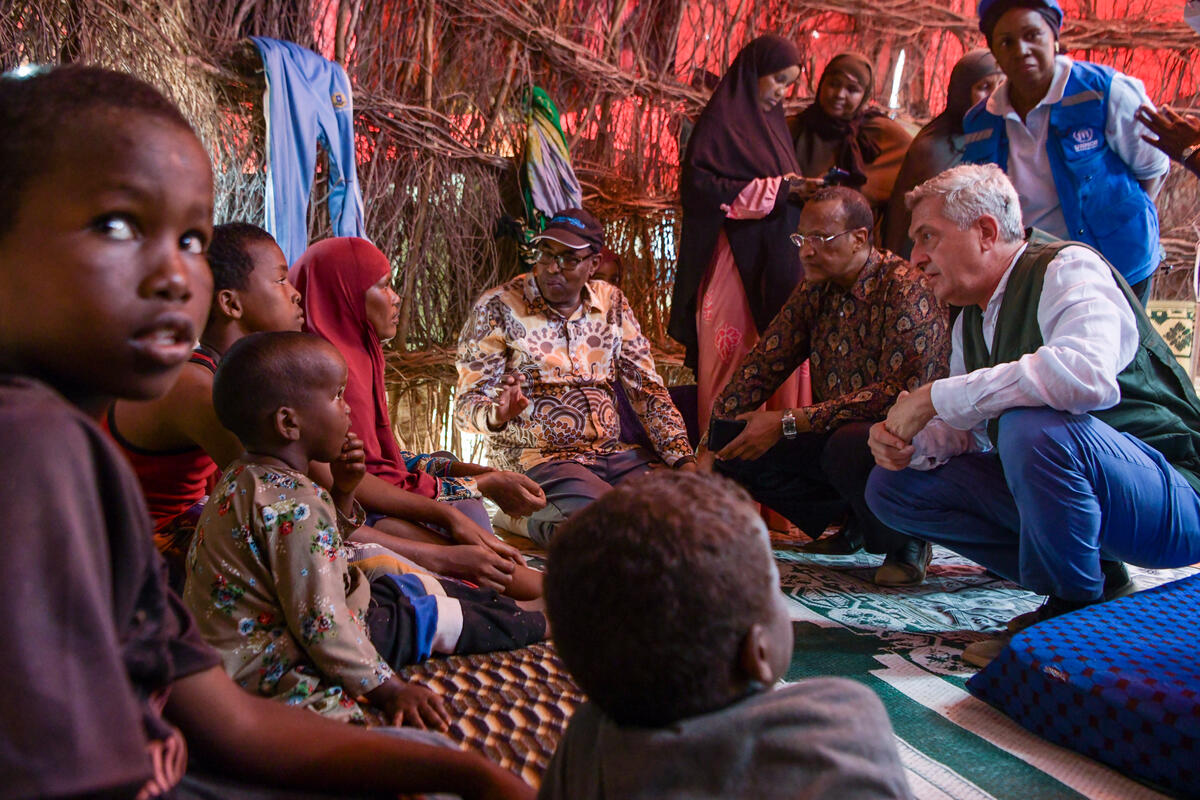The humanitarian suffering continues in Ukraine, despite a ceasefire
The humanitarian suffering continues in Ukraine, despite a ceasefire

KHARKIV, Ukraine, September 19 (UNHCR) - Under the imposing dome of the Stalin-era train station of Kharkiv, with its paintings of triumphant peasants and workers, dozens of exhausted travellers lie sprawled and sleeping on benches in a corner of the lobby.
They are internally displaced people (IDP) from the conflict in eastern Ukraine. The station is a hub and a place to find help. At a long table, volunteers, aided by UNHCR workers, are ready with advice and food.
Liuba is in desperate need of help. Her ordeal has reduced her to tears. Three weeks earlier, in the intense fighting in her town of Snizhnye, Grad missiles rained down on her apartment building. She was hit.
"I turned right at the moment when the Grad missile landed. The house began to collapse, windows were raining down on us. My legs were injured by the shrapnel, and a shock wave hit my eyes. One eye immediately went blind, and the sight in the other one became cloudy," Liuba told UNHCR.
She and her husband crawled to the basement, but Liuba's mother was on the sixth floor of their building. "My mother had stayed there alone under the missiles and bullets. We went to the sixth floor and took her," she explained.
With almost the last money they had, the three hired a car and then bought train tickets to escape the battle zone. They were now IDPs, three among more than 300,000. That's the official figure, but UNHCR officials believe the real number is two to three times higher. Many simply find shelter with relatives or friends and don't alert anyone.
Liuba's ordeal was not over. For three days in Kharkiv she pleaded for an operation to try to save her eye. She was finally sent to Odessa, on the other side of the country, where the operation took place. She will not know whether she'll regain any sight for a month.
Meanwhile she and her husband Nikolai must get help to repay the cost of the operation - hundreds of dollars. Svetlana, a local UNHCR worker, accompanies them to the regional health department to register for help to underwrite the operation. But the department officials tell her there will be no help. She should have registered before the operation. Liuba is devastated. They are in debt with no home to return to.
"I don't know what the future will bring. So far I've only been registered as an IDP. But I haven't received any help from the government. We don't know where to live anymore," Liuba said.
"We can't go home because the trains don't go there and, if we go, there's no gas, the windows are broken. So we won't have any heat. What will we do this winter? It's horrible. We don't know. We don't sleep at night with worry," the worried woman added.
According to UNHCR's representative in Ukraine, Oldr(ich Andrýsek, her problem is typical of that of many. The hundreds of thousands of IDPs from east Ukraine, not to mention the 17,000 Crimean IDPs who have been uprooted for months, are not given priority or money by the government, preoccupied as it has been with trying to reclaim lost territory.
"The government of Ukraine will do what the international community allows it to do," he says. But, with a shaky ceasefire in place, some IDPs are going back. "We saw it in Slaviansk a couple of months ago," Andrýsek says. "One day after the fighting stopped there, people were going back."
On the road outside Slaviansk a rickety local bus stops and passengers get out to stretch their legs and go to the bathroom. They are going back, after weeks as IDPs, to their towns of Pervo Mai and Branca in the Luhansk region.
The fighting there was bitter and deadly. But now, says Oleg, it is relatively safe. "It's been quiet for a week-and-a-half. Well, of course, there's been shooting. But it's quiet." As they board the bus again, all look tired and none look joyful. A ceasefire is not peace and their return is nothing if not uncertain.
By Don Murray in Kharkiv, Ukraine









